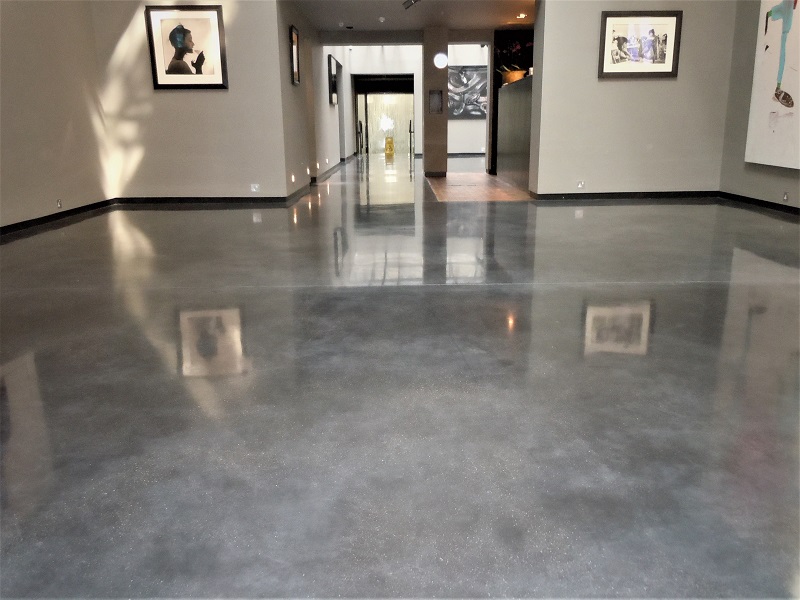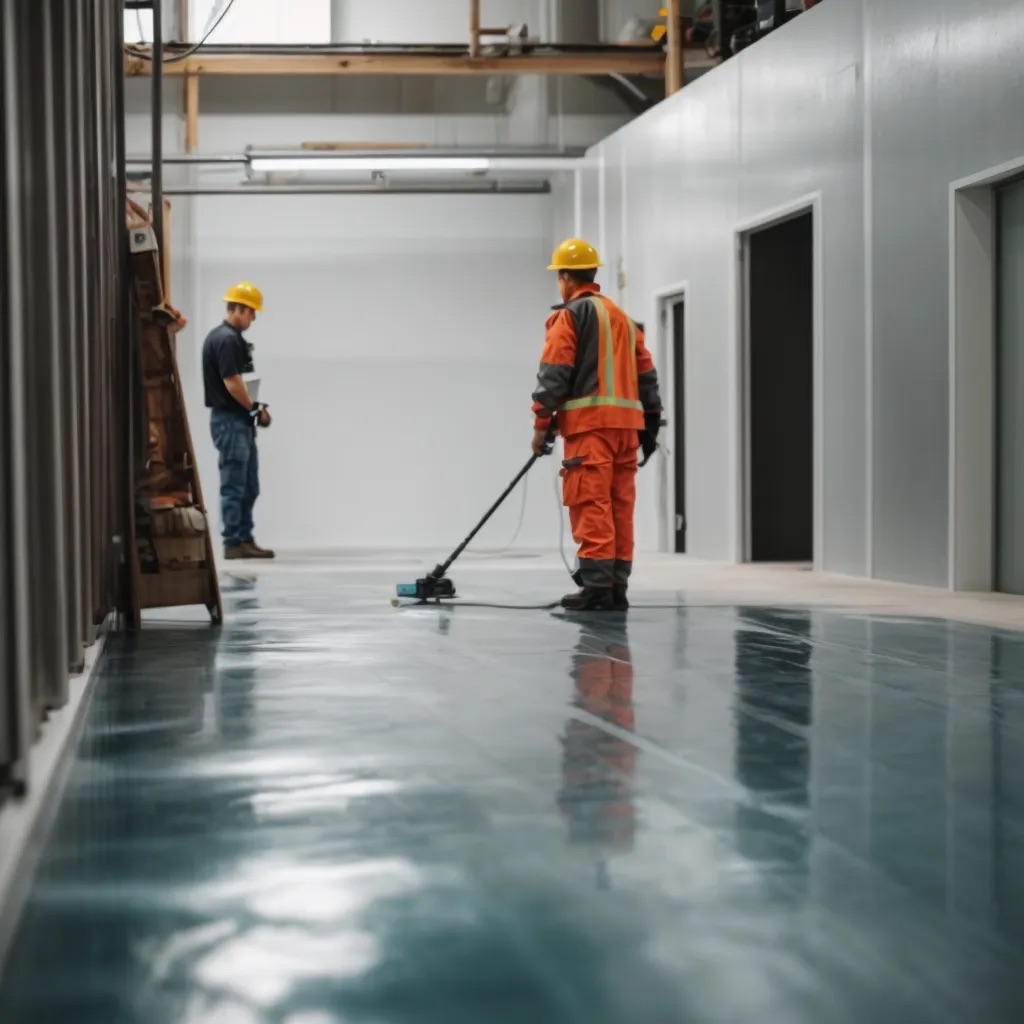
They say that “an ounce of prevention is worth a pound of cure,” and when it comes to your floors, this couldn’t be more true. Epoxy flooring offers a multitude of benefits, but perhaps one of its most impressive features lies in its resistance capabilities. From durability to moisture resistance, epoxy flooring is designed to withstand the test of time. But what exactly makes it so resistant? In this discussion, we will uncover the various resistance features of epoxy flooring, giving you a glimpse into how it can protect your floors in ways you never thought possible.
Durability: Why Epoxy Flooring Is Built to Last
When it comes to durability, epoxy flooring stands out as a top choice due to its exceptional strength and longevity. Epoxy is a thermosetting polymer that is formed by mixing resin and hardener. The resulting chemical reaction creates a hard, rigid material that can withstand heavy loads and high foot traffic. This makes epoxy flooring ideal for industrial and commercial settings where durability is paramount.
One of the key features that contribute to the durability of epoxy flooring is its high compressive strength. Epoxy coatings can withstand immense pressure without cracking or breaking. This makes them resistant to damage from heavy machinery, forklifts, and other equipment commonly found in industrial environments. In addition, epoxy flooring has excellent impact resistance, which means it can absorb the force of dropped objects without sustaining significant damage.
Furthermore, epoxy flooring is highly resistant to chemicals and abrasion. It can withstand exposure to a wide range of chemicals, including acids, solvents, and oils, without deteriorating or staining. This makes epoxy flooring a popular choice in garages, laboratories, and manufacturing facilities where spills are common. Additionally, the abrasion resistance of epoxy flooring ensures that it will not easily wear down or erode, even in high-traffic areas.
Impact Resistance: How Epoxy Flooring Can Withstand Heavy Use
Epoxy flooring demonstrates exceptional impact resistance, making it a reliable choice for withstanding heavy use in various industrial and commercial environments. Whether it’s the constant movement of heavy machinery or the frequent dropping of tools and equipment, epoxy flooring can handle the daily wear and tear without losing its structural integrity.
One of the main reasons why epoxy flooring is so impact resistant is its composition. It is made by combining epoxy resin with a hardening agent, resulting in a highly durable and strong material. This combination allows the flooring to absorb and distribute impact forces, preventing them from causing any significant damage.
Additionally, epoxy flooring has a high compressive strength, which means it can withstand heavy loads without cracking or breaking. This is especially important in industries where heavy equipment, such as forklifts and pallet jacks, are constantly moving around. The flooring can withstand the weight and impact caused by these machines, ensuring a safe and stable working environment.
Furthermore, epoxy flooring is resistant to chipping, cracking, and peeling. This is due to its seamless and non-porous nature, which prevents water, chemicals, and other substances from seeping into the flooring and causing damage. As a result, the flooring remains intact even under heavy use, reducing the need for frequent repairs or replacements.
Chemical Resistance: Protecting Your Floors From Harmful Substances
To protect your floors from the harmful effects of chemicals, epoxy flooring offers exceptional resistance and durability. Epoxy is known for its ability to withstand exposure to a wide range of chemicals, making it an ideal choice for industrial and commercial applications where spills and leaks are common. Whether you are dealing with acids, solvents, oils, or cleaning agents, epoxy flooring can provide a protective barrier that prevents damage to your floors.
Epoxy flooring is made up of a resin and a hardener that, when combined, create a strong and durable material. This material is highly resistant to chemical penetration, which means that even if a spill occurs, it is less likely to seep into the floor and cause damage. The seamless nature of epoxy flooring also contributes to its chemical resistance, as there are no joints or seams for chemicals to penetrate and weaken the floor.
In addition to its resistance to chemical penetration, epoxy flooring is also highly resistant to staining. This means that even if a spill occurs, the epoxy surface can be easily cleaned and restored to its original state. The smooth, non-porous surface of epoxy flooring prevents chemicals from being absorbed, making it easier to maintain and keep clean.
When it comes to protecting your floors from harmful substances, epoxy flooring is a top choice. Its exceptional chemical resistance and durability make it an ideal flooring option for industries that deal with hazardous substances on a regular basis. By choosing epoxy flooring, you can ensure that your floors remain in excellent condition and free from the damaging effects of chemicals.
Stain Resistance: Keeping Your Floors Looking Clean and Pristine
Achieve a spotless and impeccable appearance for your floors with the exceptional stain resistance of epoxy flooring. Epoxy flooring is known for its ability to resist stains, making it an ideal choice for areas that are prone to spills and accidents. Whether it’s in a garage, workshop, or commercial space, epoxy flooring can keep your floors looking clean and pristine for years to come.
The stain resistance of epoxy flooring is due to its non-porous nature. Unlike other flooring options, epoxy creates a seamless and impermeable surface that prevents liquids from seeping into the floor. This means that any spills or stains can be easily wiped away without leaving a trace. From oil and grease to chemicals and food spills, epoxy flooring can withstand a wide range of substances without staining or discoloration.
One of the key features of epoxy flooring is its resistance to chemical stains. Epoxy is highly resistant to a variety of chemicals, including acids, solvents, and detergents. This makes it an excellent choice for environments where chemical spills are common, such as laboratories, industrial facilities, and commercial kitchens. With epoxy flooring, you can rest assured that your floors will remain resistant to chemical stains, maintaining their pristine appearance even in the face of harsh substances.
In addition to chemical resistance, epoxy flooring also offers excellent stain resistance against everyday substances. From coffee and wine spills to ink and markers, epoxy flooring can withstand a wide range of stains without leaving a lasting mark. This makes it an ideal choice for residential spaces, where accidents and spills are inevitable. With epoxy flooring, you can easily maintain a clean and pristine look, even in high-traffic areas.
Moisture Resistance: Preventing Damage From Water and Humidity
Prevent water and humidity damage with the exceptional moisture resistance of epoxy flooring. Epoxy flooring is highly resistant to water and humidity, making it an ideal choice for areas prone to moisture, such as basements, bathrooms, and kitchens. The unique composition of epoxy, a combination of resin and hardener, creates a strong and impermeable surface that can withstand the effects of water and humidity.
One of the main benefits of epoxy flooring is its ability to prevent moisture-related damage. Unlike traditional flooring options, epoxy creates a seamless and non-porous surface, leaving no room for water or moisture to seep through. This prevents the growth of mold, mildew, and bacteria, which are commonly associated with damp environments. By eliminating the presence of moisture, epoxy flooring helps maintain a clean and healthy indoor environment.
Epoxy flooring also offers excellent resistance to water damage caused by spills or leaks. Its non-absorbent properties allow for easy cleanup and prevent water from penetrating the surface and causing long-term damage. This is particularly important in areas where water exposure is common, such as garages or industrial facilities.
Furthermore, epoxy flooring is highly resistant to the effects of humidity. Moisture in the air can often lead to swelling, warping, or cracking of traditional flooring materials. However, epoxy’s moisture resistance ensures that the flooring remains stable and intact, even in high humidity environments. This makes it a suitable choice for regions with humid climates or areas with poor ventilation.










